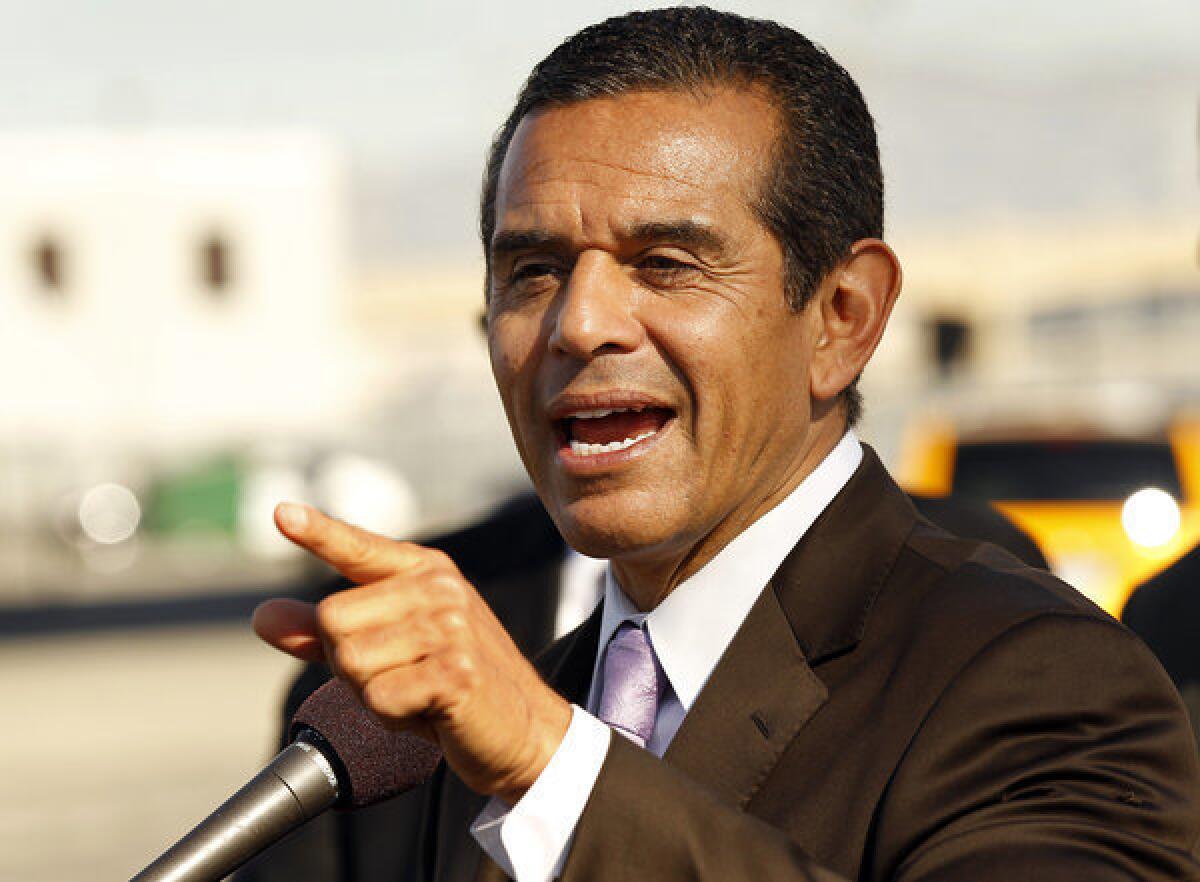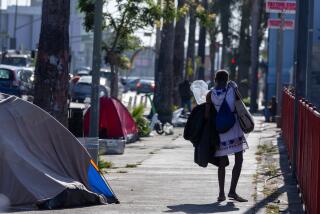Villaraigosa’s legacy rides on transit plan

- Share via
Los Angeles Mayor Antonio Villaraigosa’s bid to indefinitely extend a transportation sales tax marks perhaps a last chance to jump-start what he hopes will be the cornerstone of his legacy: dramatically expanding rail service in L.A.
A year before he leaves office, the mayor is desperate to break a logjam that has stalled his vision of quickly building a sprawling, interconnected rail system, including a subway extension across the traffic-clogged Westside.
With congressional Republicans blocking his effort to tap a major source of federal financing, Villaraigosa is turning once again to the voters — hoping they will extend a half-cent sales tax increase he backed four years ago beyond its 2039 expiration date. The move would allow officials to borrow against nearly 50 years of future tax revenue and quickly raise an additional $8 billion for highway and transit projects.
GRAPHIC: Rail projects in Los Angeles
Asking voters to keep taxing themselves for generations to come is likely to turn the proposal into a referendum on L.A.’s ambitious rail plan — and Villaraigosa’s enthusiastic championing of it.
“It’s critical to the mayor,” said Jaime Regalado, emeritus professor of political science at Cal State L.A. “He’s not getting what he wants out of the Republican House in terms of transportation dollars for his legacy, so he figures this is his only remaining hope.”
With an additional $8 billion, officials say, they could complete a Westside subway extension and rail lines to LAX, Torrance and perhaps even Whittier in a fraction of the currently projected time. For example, the Green Line could be connected to LAX in just six years, a decade sooner than planned, the mayor’s office says. The Wilshire Boulevard subway could be extended to Westwood in a little over a decade — half the time now contemplated.
While the mayor’s plan would greatly speed up rail construction, it would come at a price. Metropolitan Transportation Authority spokesman Marc Littman acknowledged that borrowing costs would be “a lot more” because of the increased interest payments. Although the exact amount of the increased financing cost is not known, Metro is currently short $4 billion that would be needed to meet the accelerated construction schedule, officials said. But Littman said building faster could save money in the long run by allowing Metro to take advantage of cheaper construction costs and low inflation and interest rates.
If Metro stuck with the original 30-year construction timeline envisioned in Measure R, the agency would need to borrow less to complete the proposed rail and bus projects.
Villaraigosa has boasted that Los Angeles County embraced his Measure R transit tax increase in late 2008 despite the deep recession. Less clear is whether voters will be in as charitable a mood this year.
Voters are more confident about the region’s economy than they were four years ago, said Los Angeles Area Chamber of Commerce President Gary Toebben. “But I can’t say that the trust in government in general is any more positive, and both of these will come into play,” he said.
Villaraigosa wants the measure on the ballot in November, when Democratic voter turnout is expected to be higher than at any point since 2008, the year Measure R was approved. As it was then, the ballot will probably be crowded with tax measures to balance the state budget and pay for Los Angeles school improvements.
That could create a perilous situation for all the measures, said Kris Vosburgh, executive director of the Howard Jarvis Taxpayer Assn., which already opposes the school district tax increase.
“The more tax measures are on the ballot, the more likely people in … a state with high unemployment are going to look at these and say, ‘Ugh, I’ll vote no on everything,’ ” he said.
Compressing transit and highway construction within a single decade would create tens of thousands of jobs in a city still struggling with 13% unemployment.
County Supervisor and MTA board member Mark Ridley-Thomas is unsure whether Metro can efficiently manage and build so many major rail projects simultaneously. The tax extension would be a “tall order” for voters to accept, he said.
“There is a phenomenon of voter fatigue — and the issue of how voters want to use an increasingly limited” amount of funds, he said.
Two-thirds of voters would have to approve the transit tax extension. Some recent independent polls have shown about 54% support, while backers say their polls show about 70% support. The original increase passed with 67.93% of the vote.
Denny Zane, executive director of the nonprofit group Move LA, is confident of passage, saying the measure is simply an extension of a tax that will go into effect decades in the future. Similar proposals have succeeded with voters in Riverside and Orange counties, he said. “Extensions do better with voters than the original measures,” he added.
Staff Writer Dan Weikel contributed to this story
More to Read
Sign up for Essential California
The most important California stories and recommendations in your inbox every morning.
You may occasionally receive promotional content from the Los Angeles Times.












